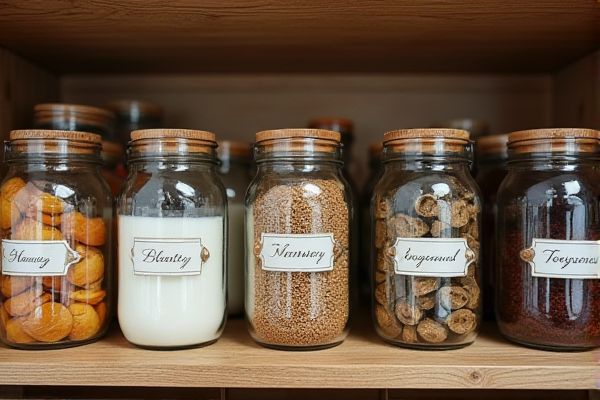
Apothecary jars offer an elegant, vintage aesthetic and airtight seals ideal for preserving herbs and spices, while mason jars provide versatile, affordable storage with easy labeling and stacking capabilities perfect for a functional pantry. Discover how choosing the right jar can transform Your pantry organization in the rest of the article.
Table of Comparison
| Feature | Apothecary Jars | Mason Jars |
|---|---|---|
| Material | Glass, often decorative with glass lids | Durable glass with metal screw lids |
| Sealing | Loose or tight-fitting lids, less airtight | Airtight seal for long-term storage |
| Size Range | Various decorative sizes, typically medium-large | Wide range from small (4 oz) to large (64 oz) |
| Purpose | Primarily decorative, ideal for dry goods & display | Functional for preserving, canning, and pantry storage |
| Visibility | Clear glass with vintage aesthetics | Clear glass, often marked with measurement scales |
| Cost | Higher price due to design and aesthetics | Generally affordable and widely available |
| Stackability | Limited, usually not designed for stacking | Designed to stack or nest efficiently |
| Cleaning | Hand wash recommended due to lid design | Dishwasher safe and easy to clean |
Introduction: Apothecary Jars vs Mason Jars for Pantry Organization
Apothecary jars offer a vintage aesthetic and are typically made of thick glass with elegant lids, making them ideal for displaying pantry staples like spices and dry herbs. Mason jars provide airtight sealing and durability, perfect for preserving freshness of bulk items such as grains, nuts, and homemade preserves in the pantry. Both jar types enhance pantry organization by providing clear visibility and durable storage options tailored to different food preservation needs.
Historical Origins of Apothecary and Mason Jars
Apothecary jars originated in the 18th century as glass containers used by pharmacists to store medicinal herbs and powders, emphasizing airtight seals to preserve contents. Mason jars were invented in 1858 by John Landis Mason and revolutionized home canning with a screw-on lid and rubber seal, designed to keep food fresh longer in pantries. Both jars highlight advancements in preservation, with apothecary jars rooted in pharmaceutical history and Mason jars in domestic food storage innovation.
Design Aesthetics: Comparing Jar Styles
Apothecary jars feature elegant, vintage-inspired designs with smooth curves and decorative lids, enhancing the visual appeal of any pantry display. Mason jars offer a more rustic, utilitarian look with embossed logos and screw-top lids, providing a classic charm that suits farmhouse or casual kitchen styles. Your choice depends on whether you prefer a sophisticated, ornamental aesthetic or a practical, timeless appearance for pantry organization.
Material and Durability Differences
Apothecary jars are typically made from thick glass and often feature airtight lids, providing durability and protection against moisture and air, which is ideal for preserving herbs and spices in your pantry. Mason jars, crafted from tempered glass with metal screw-top lids, offer robust sealing and withstand temperature changes, making them suitable for both storage and canning purposes. Choosing between the two depends on your preference for aesthetic appeal versus functional versatility in pantry organization.
Airtight Seal: Preserving Freshness in Pantry Storage
Apothecary jars often feature decorative lids that may lack a tight airtight seal, making them less effective at preserving freshness in pantry storage compared to mason jars. Mason jars are designed with screw-on metal lids and rubber gaskets that provide a secure airtight seal, preventing moisture and air from spoiling your pantry ingredients. For optimal preservation of dry goods, choosing mason jars ensures longer-lasting freshness and protection against contamination.
Versatility and Use Cases in the Pantry
Apothecary jars offer elegant glass storage ideal for dry goods like candy, spices, and tea, enhancing visual appeal while maintaining freshness with airtight lids. Mason jars provide a practical solution for preserving homemade jams, pickles, and bulk pantry items, featuring durable construction and versatile size options for easy stacking and organization. Both jar types contribute to pantry efficiency, with apothecary jars suited for display and frequent access, and mason jars excelling in long-term food preservation and multitasking use.
Ease of Cleaning and Maintenance
Apothecary jars typically feature wide mouths and smooth glass surfaces, making them easier to clean thoroughly and maintain without residue buildup in pantry storage. Mason jars, while also made of durable glass, often have narrower openings and metal lids that may require more detailed scrubbing and careful drying to prevent rust or mold growth. Your choice depends on the balance between aesthetic appeal and the simplicity of regular cleaning in your pantry organization.
Space Optimization and Stackability
Apothecary jars often have wider bases and decorative lids, limiting stackability and efficient use of vertical pantry space, whereas mason jars feature uniform shapes and screw-top lids that enable secure stacking and better space optimization. Your pantry's storage capacity can be maximized with mason jars due to their compact design and airtight sealing, which preserves the freshness of stored goods while minimizing clutter. Choosing mason jars over apothecary jars enhances organization by allowing you to stack multiple containers safely and save valuable shelf space.
Cost Comparison: Investment Value
Apothecary jars typically carry a higher upfront cost due to their decorative design and premium glass materials, making them a stylish yet pricier investment for pantry storage. Mason jars offer a more budget-friendly option, with durable construction and widespread availability that provides excellent value for long-term use. Comparing cost efficiency, mason jars deliver practical savings while apothecary jars contribute aesthetic appeal and potential resale value in a well-curated pantry collection.
Choosing the Right Jar for Your Pantry Needs
Apothecary jars offer elegant, airtight storage ideal for displaying dry goods like spices and herbs, preserving freshness while adding aesthetic appeal to your pantry. Mason jars provide versatile, durable containers with secure lids perfect for canning, storing bulk items, and organizing loose pantry staples. Choosing the right jar depends on your storage priorities; apothecary jars suit decorative needs, while mason jars excel in functionality and preserving your pantry essentials.
 homyna.com
homyna.com